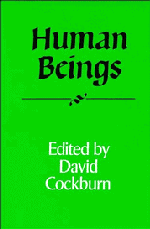Book contents
- Frontmatter
- Contents
- Introduction
- Machines as Persons?
- The Importance of Being Human
- Response to McNaughton
- Response to Diamond
- Real Selves: Persons as a Substantial Kind
- Personal Identity and Brain Transplants
- Personal Identity and the Idea of a Human Being
- Imagination and the Sense of Identity
- Radical Critique, Scepticism and Commonsense
- Getting the Subject back into the World: Heidegger's Version
- Incarnational Anthropology
- How Many Selves Make Me?
- Sartre and Our Identity as Individuals
- Bibliography
- Notes on Contributors
- Index
Incarnational Anthropology
Published online by Cambridge University Press: 05 February 2015
- Frontmatter
- Contents
- Introduction
- Machines as Persons?
- The Importance of Being Human
- Response to McNaughton
- Response to Diamond
- Real Selves: Persons as a Substantial Kind
- Personal Identity and Brain Transplants
- Personal Identity and the Idea of a Human Being
- Imagination and the Sense of Identity
- Radical Critique, Scepticism and Commonsense
- Getting the Subject back into the World: Heidegger's Version
- Incarnational Anthropology
- How Many Selves Make Me?
- Sartre and Our Identity as Individuals
- Bibliography
- Notes on Contributors
- Index
Summary
Introduction
The renaissance of philosophy of mind within the analytical tradition owes a great deal to the intellectual midwifery of Ryle and Wittgenstein. It is ironic, therefore, that the current state of the subject should be one in which scientific and Cartesian models of mentality are so widely entertained. Clearly few if any of those who find depth, and truth, in the Wittgensteinian approach are likely to be sympathetic to much of what is most favoured in contemporary analytic philosophical psychology. Finding themselves in a minority, they might well look elsewhere for support, hoping to establish the idea that opposition to scientific and Cartesian ways of thinking is by no means philosophically eccentric. Perhaps this partly explains the increasing British and North American interest in ‘continental’ thought, particularly as it bears (as most of it does) on the nature of human beings. Husserl, Heidegger, Merleau-Ponty and Sartre are obvious enough subjects for such attention.
In his interesting essay ‘Getting the Subject Back into the World’, Fergus Kerr joins a growing group of English-speaking writers attracted by the work of Heidegger. Untypically, however, Kerr's attention has been caught by Heidegger's speculations about the involvement of theological ideas in the development of a view of persons as somehow set above, against or apart from the world of subjectless things. I am not a Heidegger scholar and I shall not raise any questions about Kerr's speculative interpretation of his subject.
- Type
- Chapter
- Information
- Human Beings , pp. 191 - 212Publisher: Cambridge University PressPrint publication year: 1991
- 1
- Cited by

